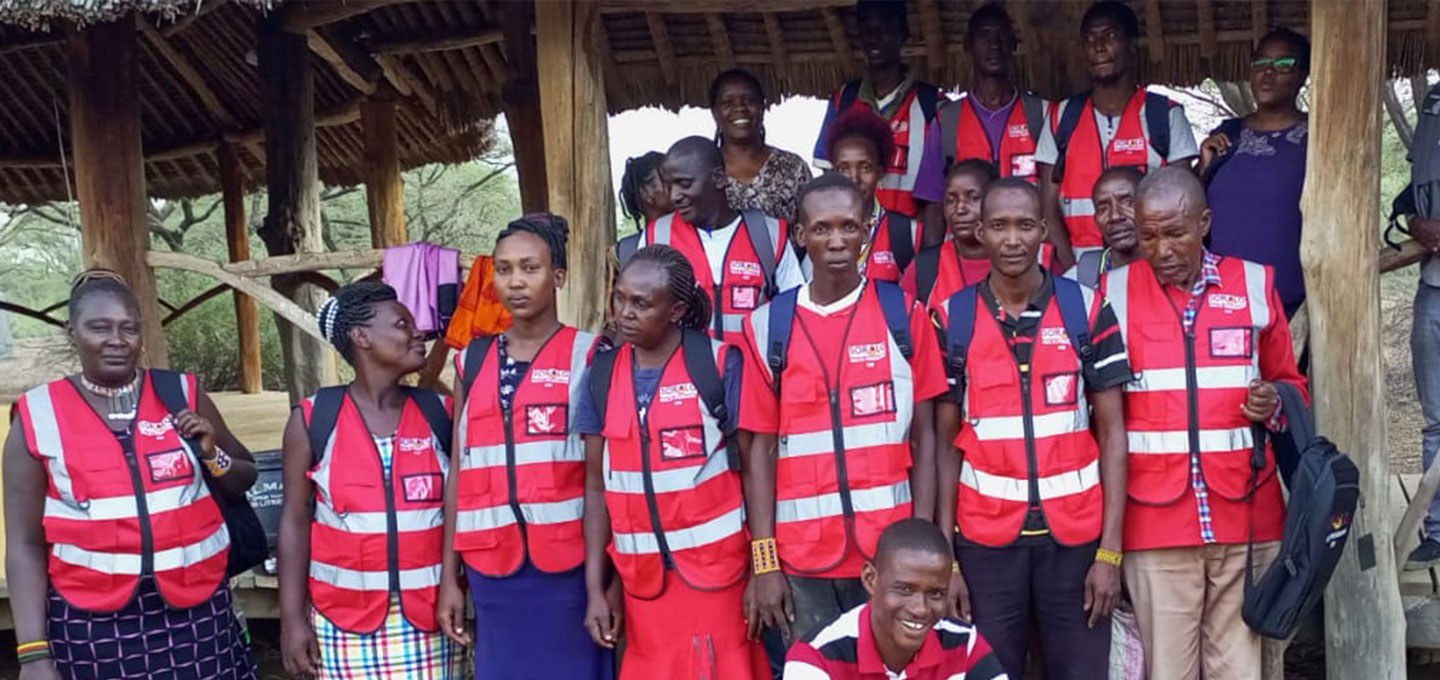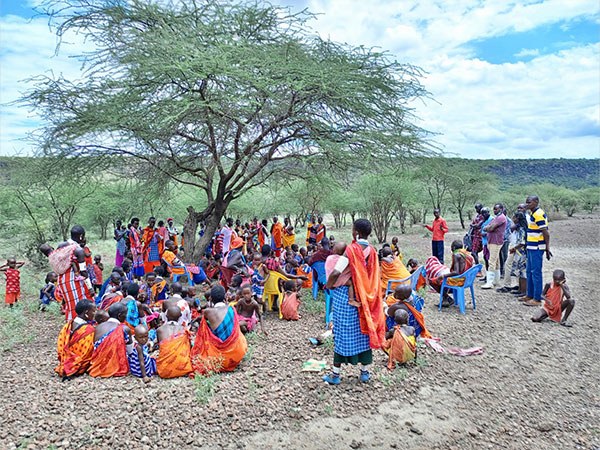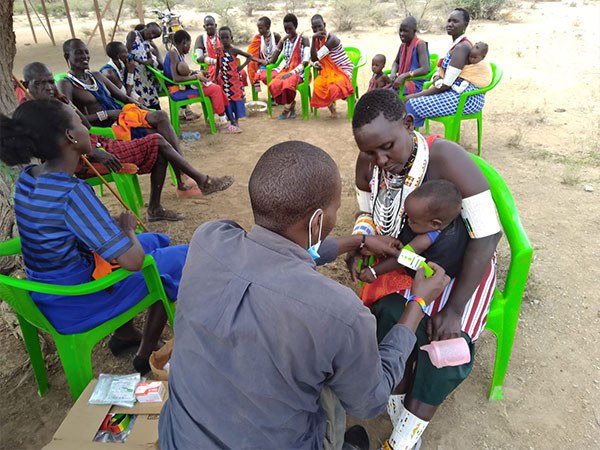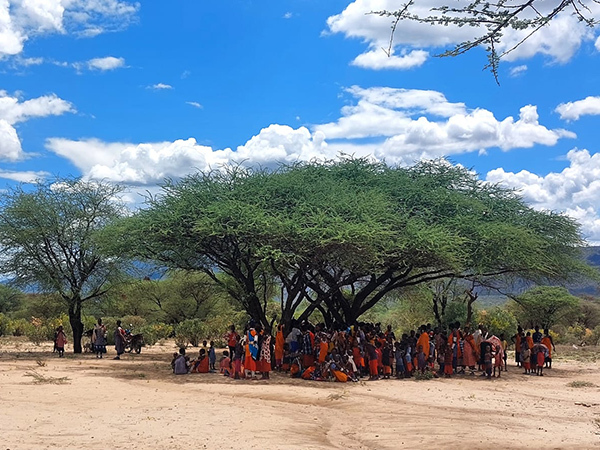
“I am passionate about educating the community”
What challenges do you and your community face?
Extreme weather events like droughts and occasional floods are a big challenge. We are pastoralists and when there is a drought or flooding people move far away from health facilities. They can give birth in remote places.
Sometimes we have floods that stop people accessing health facilities, schools and markets, for example, when they go up into the hills, and once there, people can only survive on milk from their cows and goats.
The most recent flood is slowing receding right now, but communities have lost everything which has been washed away. Right now they have started descending from the hills and are building new homes with locally available resources.
Also, outbreaks of cholera, malaria and skin diseases are on the rise since flood water is coming up from Narok and Mau and brings in all the dirty sludge to Magadi where I work. So I share information on how to prevent and cope with these diseases.

Jeremiah works with local Maasai communities in the South Rift Valley, Kenya.
Lack of drugs is a big issue. The facilities just don’t have them.
Also, the households I visit are very spread apart, and travelling between them can be very tiring.
Cultural beliefs are a challenge, such as the use of Traditional Birth Attendants (traditional midwives who are key providers of delivery services in rural areas in Kenya and across sub-Saharan Africa[1]) and we face difficulties supporting mothers to opt for skilled deliveries instead of home births. We try to encourage Traditional Birth Attendants to escort expectant mums to deliver in the clinic.
Sometimes we encounter wild animals, which might hinder access to health services. Elephants are coming close to the homes now, and mothers can’t get to Oloika health clinic easily sometimes.
Some households are very poor and cannot get to the nearest hospital in Magadi even if they were willing to.
Tell us about your role as a Community Health Worker?
For my role I visit people in their homes, collect health information, find out if anyone is pregnant, and trace defaulters (clients who refuse, delay or discontinue treatment, despite the ability to do so), especially for immunisations. If there has been a delivery, I check the child and mother and share some information on health and hygiene.
While visiting households, I might arrange an informal dialogue among the community about an issue that I have noticed. For the larger community dialogues organised by SORALO I have to mobilise and plan in advance. I go to Oloika health clinic twice a month and give health talks to people who have come for medical assistance.

SORALO organises community dialogues to raise awareness about health
What gives you the most satisfaction in your role?
The most satisfaction I am feeling is getting men involved in family planning. The men were the biggest hinderance to the uptake of family planning, and felt they had too little information about sexual and reproductive healthcare. I get big satisfaction when I am able to socialise with the men, understand their issues and help them choose family planning for their family.
“I am glad to be a Community Health Worker. It can be tiring, but I am passionate about educating the community.”
Have you seen any changes in the community since SORALO launched its community health programme?
Through my work I have seen changes. I have been effective at following up with defaulters and there has been a reduction in defaulter tracing due to the Backpack Nurse clinics.
I have seen more people willing to go to the dispensaries. They often come to me first and ask me to refer them to the dispensary.
I have also seen an increase in the uptake of family planning. Community perceptions have changed from thinking we were trying to stop them having children to understanding it is more about child spacing.
I have seen the community were really happy with the outreach clinics. One lady had a terrible skin infection and the only place she has found a solution was at SORALO’s clinic. Most of the time our medial facility is out of stock of medicines, so people liked the clinic as they knew they could get medicine.
What is the best way to enhance people’s knowledge about sexual and reproductive health?
I think the best way to educate people on sexual and reproductive health, including family planning, is to hold community dialogues for both men and women. It is the best way to hear people’s questions and give them answers.

Local communities value outreach clinics organised by SORALO
SORALO and CHASE Africa
SORALO is a community-based and community-driven land trust, uniting the 21 local Maasai communities in the South Rift Valley, Kenya. The rangeland is located between the Maasai Mara and Amboseli and hosts one of the richest large mammal populations on earth; where wildlife and pastoralist communities have co-existed for generations.
In 2021 CHASE Africa supported SORALO to launch their first community health programme. As SORALO enjoys strong relationships with local communities and works in an area where people have very poor access to health services, as well as heavy reliance upon the local natural environment for their livelihoods, food, firewood for fuel and water, CHASE Africa believed the organisation was ideally placed to integrate a health programme into its wider work.
The project improves knowledge and attitudes towards health (particularly Sexual and Reproductive Health and Rights) among women, men, and young people – due to high rates of teenage pregnancy in the region – and increases access to quality basic health services.
SORALO organises Backpack Nurse clinics to reach the most remote communities, as well as outreach clinics and community dialogues. Community Health Workers visit people in their homes and Youth Peer Providers have been trained, thanks to CHASE Africa funding, to target young people with youth-friendly services and information.
During 2023, SORALO provided 551 health services, 176 sexual and reproductive health services,158 family planning services and recorded 9071 attendances at information and awareness raising events.

[1] Traditional Birth Attendants have been blamed at times in the past for unhygienic practices in regions with high rates of maternal and child deaths. Data released by the World Health Organization in February 2023 shows that 95% of the 287,000 deaths associated with pregnancy and childbirth in 2020 occurred in poor countries, mostly in sub-Saharan Africa, because of inadequate health facilities or personnel, particularly in remote areas. Source: the Guardian
